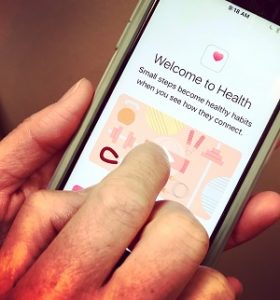
“There are large limitations in terms of the way we design health technologies for older adults,” says School of Social Work Assistant Professor Jennifer Portz, who has been studying how technology can support healthier living for the past ten years.
Portz aims to influence the development of health technologies, and improve the lives of seniors and their caregivers.
Her research, funded through a Palliative Care and Aging Research Fellowship from the National Institute on Aging, focuses on public health, gerontology, and the use of technology interventions with older adults.
In 2016, Portz completed two literature reviews on web- and mobile-based self-management products, such as apps for tracking symptoms or healthy eating. Although most users are older adults, healthcare apps commonly fail to meet their needs in terms of utilization and engagement.
“That is very well documented,” Portz said. “We know very little about older adults using technologies to manage their health, other than constant literature suggesting there are barriers to use and problems with design.”
“The issue is, chronic disease management systems, specifically when added to technology like a website, are typically not designed for older adults specifically,” said Portz. “They’re generally designed for anyone with diabetes or anyone with chronic pain.”
Older adults want to use technology
Portz sees the issue in terms of the way people feel about, and interact with, these technologies. “Older adults want to use technology. They’re the fastest growing population to use online health information. They’re the fastest growing population of internet users in general.”
 According to the Pew Research Center, Internet use among those 65 and older grew 150 percent between 2009 and 2011, the largest growth in a demographic group. Furthermore, their 2012 study showed that of those that go online, 71 percent do so daily and 34 percent use social media.
According to the Pew Research Center, Internet use among those 65 and older grew 150 percent between 2009 and 2011, the largest growth in a demographic group. Furthermore, their 2012 study showed that of those that go online, 71 percent do so daily and 34 percent use social media.
“We have preliminary evidence suggesting healthcare apps help people with disease self-care technique, in terms of health outcomes,” said Portz, “but we don’t design our technology for older adults.”
In addition, as people continue to age, care management is commonly transferred to a family member, friend, neighbor, or caregiver who is using multiple platforms for chronic diseases.
“There are often lots of people helping older adults manage their conditions,” Portz said, “and we have not designed any technology to even consider informal and formal caregivers.”
Designing a healthcare app that works for older adults
In July 2016, Portz became a research fellow with the School of Medicine at the University of Colorado Anschutz Medical Campus. She has been working with Sheena Bull of the Colorado School of Public Health, and in a health impact lab with Dr. Rebecca Boxer, associate professor in geriatric medicine at CU.
The researchers at the health impact lab have been developing a mobile app to allow heart failure patients to track their symptoms. Portz brings a social work perspective to these efforts.
“There are so many questions to ask, to support people’s utilization and engagement and ultimately lead to healthier living long term,” Portz said. “I am on the user’s side, on the patient’s side.”
This summer, Portz published “The Development and Acceptability of a Mobile Application for Tracking Symptoms of Heart Failure Among Older Adults,” with feedback from 30 seniors who tried the heart failure mobile app.
“They thought it was easy to use, and it made sense to them,” said Portz, “so it’s really a first step in indicating that this might be a good platform or vehicle for people monitoring their symptoms of heart failure.”
Using technology to address social injustice
As technologies become obsolete, people are forced to adapt to new programs and platforms, which presents an imperative for social workers.
“It’s essential for social workers to be able to provide resources, tools, access, and empowerment to help older adults, and their loved ones as caregivers, use technologies in a way that’s meaningful and supports their healthy living,” Portz said.
Portz is currently planning a pilot program to test the usability and utilization of the heart failure app after a hospitalization. “I’ll be recruiting approximately 40 adults and their caregivers,” she said, “so I’ll be looking for things like improvements in self-efficacy, self-care, and contact with providers if symptoms change.”
This type of information can ultimately create positive impacts for social workers, who commonly practice in healthcare settings and, as a provider or clinician, are faced with the responsibility of sending a patient to the right resource.
“I personally see this as a social injustice issue. I really do,” Portz stated. “I feel that older adults are going to be required to use technology to get health care. So by not providing services or supports that they need to properly or adequately use them, it’s the most vulnerable older adults that are going to be left behind.”
Through her work, Portz has continued to develop her understanding of patients’ needs and is deeply committed to using those insights in her research going forward.
“Chronic conditions don’t go away. So many people have them today, we forget the challenge of managing them,” said Portz. “For me it’s never been about the disease as much as it’s about the experience of the patient.”
The School of Social Work is part of CSU’s College of Health and Human Sciences.